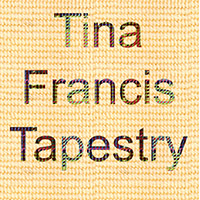Welcome to my stop on the Ho, Ho, Ho, and On We Sew monthly blog hop!
Each month throughout the year, a tutorial is offered by that month's host of HHHowS, and a linkup party as well, where you are invited to share your own Christmas makes! There is a monthly prize drawing as well. That is what I like most about Fiona's linkup. No, not the drawing, lol, the
inspiration and
clever gift-making ideas we share!
Still, those monthly prizes
are fun, and everyone who links up is eligible to win! This month, the drawing is for a pattern by Sew Sweetness (winners choice from
Sew Sweetness Pattern Shop!). I hope you will plan to link up before the end of the month!
Today I am sharing my experience playing with chenille, by way of the following tutorial, Modern Trees Rug. I have only begun to play with these techniques and throughout the process new ideas continued to flow. Please use the tutorial to make Modern Trees, or as a spring-board to design your own "patchwork" rug!
Supplies needed for Modern Trees Chenille Rug:
• Spray-baste (I used Dritz)
• Walking Foot
• Temporary fabric Marker (I used red chalk pencil)
• Size 100 Machine Needles (I used several denim
needles)
• Strong Thread (I used cotton-wrapped poly 40 from
Signature. I used 4 bobbins with this project)
• Chenille Cutter (optional, but recommended)
Want to know what you are getting into?
Press and Cut Fabrics 2hrs
Assemble Sandwich 1hr
Quilting Channels, herringbone 7hrs
or, Quilting Bias Channels 3-4hrs?
Cut Channels 2hrs
(movie time!)
Wash, Dry, Trim 2hrs
Block & let dry 8hrs
(overnight)
Trim & add Binding 1-2hrs
Make a Sample!
This
is the best way to select fabrics and plan your quilting!
I zig-zagged the edges before washing this.
My sample is loaded
with experimentation: Various batting's, channel widths, and fabrics. I compared two
layers of muslin to three. I did not care for the effect of the stripe, nor the
toile that I sneaked in. I preferred the fray of the Connecting Threads fabric vs. the Kona Solid. Inside the black square, I have one layer of Quilter's Dream Cotton on top of the denim, it is channel-cut under the muslin. That area is more narrow as well, about 1/4". Love the wavy-channeling!
Modern Trees Rug, Fabric and Cutting Requirements:
Finished Size: 31.5" x 23.5"
Muslin, base of rug: cut 1: 27" x 34"
Muslin, for chenille: cut 2: 24" x 32"
Batting, Cotton: cut 2: 27" x 34" (I used Warm &
Natural)
Denim, chenille base: cut 1: 27" x 34" (this layer
shows through chenille, and serves as the border)
Denim, raw-edge binding: cut 4 x 1.5" strips, longer than the sides by a couple inches
Quilt Cotton, navy trees: cut 9: 6" x 7" tall, sub-cut trees as
pictured
Draw a Layout Grid:
Using a chalk pencil, draw a grid for tree placement. I made light folds to mark the centers of the fabric, then measured and drew lines vertically, 3" on each side of center. Then two more lines on each side, 6" apart. Horizontally, measure 3.5" from center, then 7" from those lines. This will leave an inch or so around the perimeter and the grid does not need to be perfectly centered withing, as it will be trimmed.
Here we have an inaccurate grid that I am unable to remove from this post. hmph.
Assemble the Sandwich!
1.
Lightly spray one side of your base piece of muslin and adhere it to bottomside
of batting layers. The needle mark indents indicate the right side of fabric.
2.
Lightly spray underside of denim and adhere it to the top side of the batting
layers. Press and smooth each side of this sandwich.
3.
Lightly spray muslin chenille layer and adhere to denim. Repeat with the
gridded muslin.
4.
Lightly spray the backside of your tree pieces and adhere them using the grid
for placement. I sprayed half my pieces at a time. (note: you will have three
leftover trees)
At this point, I had still planned to add navy strips for a border. With that plan, the chenille would run edge-edge and would simplify the quilting a bit. Instead, I decided to lightly lift those edges,
and trim the white border off altogether.
Mark your Quilting Guidelines
Use
chalk to draw vertical lines down the center of each tree.
Draw
your first row of quilting across the bottom, using 45˚
lines. (I ended up marking the bottom row of each tree..)
Stitch!
Stitch
the first row along the drawn line, securing the beginning and ending of each
row with plenty of backstitching.
Clip threads and stitch the second row
3/8" from the first. I have two pins only securing my sandwich and really tried to avoid manipulating it much until I could get things more stable.
I did not worry much about accuracy as far as
distance apart, although 1/4" I found too narrow for this fabric combo. You
may want a stiletto to keep your tree edges from catching, and to help catch
treetops as well. The whole process is pretty forgiving though, so just keep
stitching!
Two hours in, I only have 10 rows stitched. I have never been a fast quilter, but I did pick it up a bit at this point...
Just keep quilting...
Once the channels are complete, change to your thread of choice and quilt your border. I simply channeled all around, stitching the perimeter a few times.
Cut the Channels
I
found the medium setting to work best with my handy-dandy channel cutter. If the size is not correct, you may end up with cuts that do not run down the center of the channel, as I found out when I made my sample.
When working with herringbone, cut as far as you can through each channel, working your way up the right-side column. Then, come in with scissors and trim into the corner so you will be able to insert your cutter to continue across the row.
Work your way across the quilt, column by column.
Ready to Wash
I ran
mine through the wash inside an old pillowcase that I stitched closed (and a
couple towels for balance). I was rather surprised at how little lint was created
though, and I ended up removing it from the pillowcase part way through drying.
TA-DA!
Not
done yet, but looking pretty! Trim to tidy threads and tree-tips.
Let's take care of those wavy edges..
Blocking
Run
it through the wash one more time, or saturate in the bathtub and spin-dry.
Block/Pat it out flat to dry.
Once dry, trim edges 1.5" from patchwork to prepare for binding.
Raw-Edge Binding
I
chose this method to finish the edges with less bulk! Traditional, double-fold binding with quilter's cotton would work well too.
I came in with permanent black ink and dabbed the little white spots later.
 |
| I never call it a finish until I have cleaned Bernie! Still a champ after 25yrs! |
Cozy on the feet!
I hope you enjoyed the tutorial, perhaps you are inspired to try your hand with chenille!
Please share your holiday makes by linking up! Anything you have
finished this month that is intended for Christmas qualifies, whether
for gift-giving or for decoration!
And for more Christmas gift-giving ideas, visit:
Thank you to all the fabulous sponsors of Ho, Ho, Ho, and on we Sew!



















































